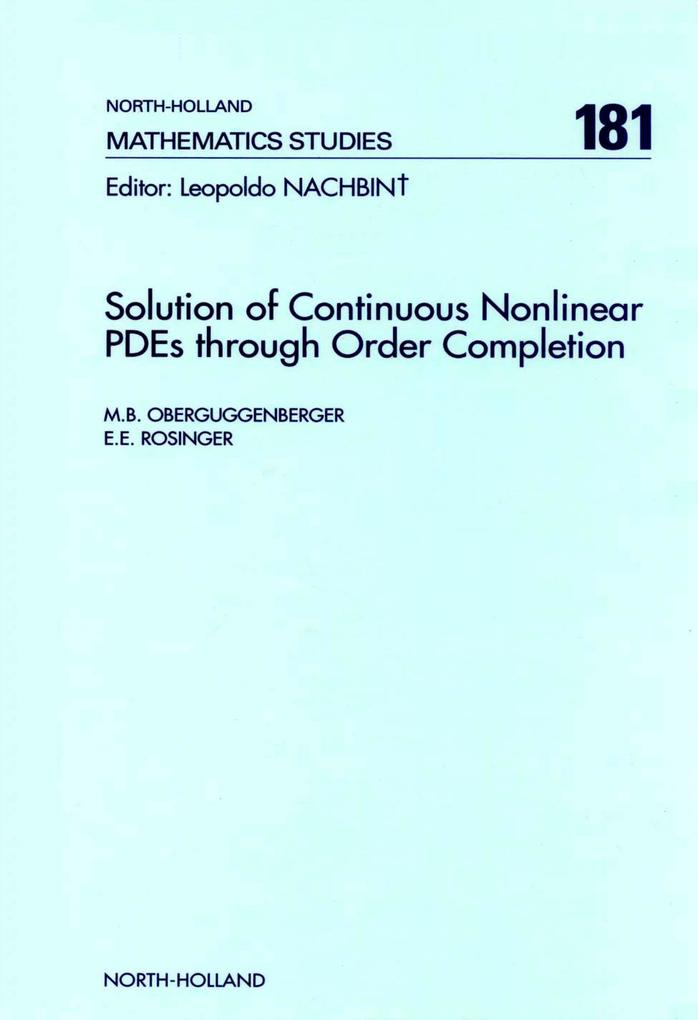
Sofort lieferbar (Download)
This work inaugurates a new and general solution method for arbitrary continuous nonlinear PDEs. The solution method is based on Dedekind order completion of usual spaces of smooth functions defined on domains in Euclidean spaces. However, the nonlinear PDEs dealt with need not satisfy any kind of monotonicity properties. Moreover, the solution method is completely type independent. In other words, it does not assume anything about the nonlinear PDEs, except for the continuity of their left hand term, which includes the unkown function. Furthermore the right hand term of such nonlinear PDEs can in fact be given any discontinuous and measurable function.
Inhaltsverzeichnis
1;Front Cover;1 2;Solution of Continuous Nonlinear PDEs Through Order Completion;4 3;Copyright Page;5 4;Table of Contents;14 5;PART I: GENERAL EXISTENCE OF SOLUTIONS THEORY;18 5.1;Section 1. Introduction;20 5.2;Section 2. Approximation of Solutions of Continuous Nonlinear PDEs;28 5.3;Section 3. Spaces of Generalized Functions;41 5.4;Section 4. Extending T(x,D) to the Order Completion of Spaces of Smooth Functions;48 5.5;Section 5. Existence of Generalized Solutions;55 5.6;Section 6. A Few First Examples;82 5.7;Section 7. Generalized Solutions as Measurable Functions;91 5.7.1;7.1. And the Measurable Functions;91 5.7.2;7.2. The Flabby Sheaf Structure of um(n)*;111 5.7.3;7.3. Further Examples and Counterexamples;163 6;PART II: APPLICATIONS TO SPECIFIC CLASSES OF LINEAR AND NONLINEAR PDEs;176 6.1;Section 8. The Cauchy Problem for Nonlinear First Order Systems;178 6.2;Section 9. An Abstract Existence Result;201 6.3;Section 10. PDEs with Sufficiently Many Smooth Solutions;212 6.4;Section 11. Nonlinear Systems with Measures as Initial Data;227 6.4.1;11.1. Extension of an Existence Result;227 6.4.2;11.2. The Meaning of Generalized Solutions;242 6.5;Section 12. Solution of PDEs and the Completion of Uniform Spaces;254 6.6;Section 13. Partial Orders Compatible with a Nonlinear Partial Differential Operator;280 6.7;Section 14. Miscellaneous Results;295 6.8;14.1. Preliminaries;295 6.9;14.2. Simultaneous Solvability of a Family of Nonlinear PDEs;295 6.10;14.3. Strengthened Approximation and Existence Results with Conditions on Derivatives;305 7;PART III: GROUP INVARIANCE OF GLOBAL GENERALIZED SOLUTIONS OF NONLINEAR PDEs;312 7.1;Section 15. Introduction;314 7.2;Section 16. Group Invariance of Global Generalized Solutions of Nonlinear PDEs Obtained Through the Algebraic Method;316 7.2.1;16.0. Preliminaries;316 7.2.2;16.1. Hilberts Fifth Problem;316 7.2.3;16.2. Review of the Global Existence Result;323 7.2.4;16.3. Group Transformations for Functions;330 7.2.5;16.4. Group Transforma
tions for Algebras of Generalized Functions;332 7.2.6;16.5. Group Invariance for Global Generalized Solutions;336 7.2.7;16.6. Computing Symmetry Groups for Global Generalized Solutions;16 7.2.8;16.7. Application to Delta Waves of Semilinear Hyperbolic PDEs;342 7.2.9;16.8. Application to Shock Waves;348 7.2.10;16.9. The Case of Local Groups of Transformations;357 7.2.11;16.10. Local Group Invariance;361 7.3;Section 17. Group Invariance of Generalized Solutions Obtained Through the Algebraic Method : An Alternative Approach;371 7.3.1;17.0. Preliminaries;371 7.3.2;17.1. A Brief Review of the Structure of Colombeaus Generalized Functions;372 7.3.3;17.2. Group Transformations on G(LRn);376 7.3.4;17.3. Group Invariance of Global Generalized Solutions;378 7.3.5;17.4.Symmetry Groups for Generalized Solutions;380 7.4;Section 18. Group Invariance of Global Generalized Solutions Obtained Through the Order Completion Method;382 7.4.1;18.1. Introduction;382 7.4.2;18.2. Group Transformations of Spaces of Generalized Functions;383 7.4.3;18.3. Group Transformations of Dedekind Order Completions;392 7.4.4;18.4. Group Invariance of Global Generalized Solutions;396 7.4.5;18.5. Computing Symmetry Groups for Global Generalized Solutions;396 7.4.6;18.6. Application to Delta Waves, Klein-Gordon Equations and Shock Waves;400 8;Appendix;406 9;References;438 10;Index;446
tions for Algebras of Generalized Functions;332 7.2.6;16.5. Group Invariance for Global Generalized Solutions;336 7.2.7;16.6. Computing Symmetry Groups for Global Generalized Solutions;16 7.2.8;16.7. Application to Delta Waves of Semilinear Hyperbolic PDEs;342 7.2.9;16.8. Application to Shock Waves;348 7.2.10;16.9. The Case of Local Groups of Transformations;357 7.2.11;16.10. Local Group Invariance;361 7.3;Section 17. Group Invariance of Generalized Solutions Obtained Through the Algebraic Method : An Alternative Approach;371 7.3.1;17.0. Preliminaries;371 7.3.2;17.1. A Brief Review of the Structure of Colombeaus Generalized Functions;372 7.3.3;17.2. Group Transformations on G(LRn);376 7.3.4;17.3. Group Invariance of Global Generalized Solutions;378 7.3.5;17.4.Symmetry Groups for Generalized Solutions;380 7.4;Section 18. Group Invariance of Global Generalized Solutions Obtained Through the Order Completion Method;382 7.4.1;18.1. Introduction;382 7.4.2;18.2. Group Transformations of Spaces of Generalized Functions;383 7.4.3;18.3. Group Transformations of Dedekind Order Completions;392 7.4.4;18.4. Group Invariance of Global Generalized Solutions;396 7.4.5;18.5. Computing Symmetry Groups for Global Generalized Solutions;396 7.4.6;18.6. Application to Delta Waves, Klein-Gordon Equations and Shock Waves;400 8;Appendix;406 9;References;438 10;Index;446
Produktdetails
Erscheinungsdatum
14. Juli 1994
Sprache
englisch
Seitenanzahl
431
Autor/Autorin
M. B. Oberguggenberger, E. E. Rosinger
Verlag/Hersteller
Kopierschutz
mit Wasserzeichen versehen
Produktart
EBOOK
Dateiformat
PDF
ISBN
9780080872926
Entdecken Sie mehr
Bewertungen
0 Bewertungen
Es wurden noch keine Bewertungen abgegeben. Schreiben Sie die erste Bewertung zu "Solution of Continuous Nonlinear PDEs through Order Completion" und helfen Sie damit anderen bei der Kaufentscheidung.








